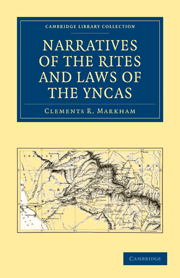Book contents
- Frontmatter
- Contents
- INTRODUCTION
- I An Account of the Fables and Rites of the Yncas
- II An Account of the Antiquities of Peru
- III A Narrative of the errors, false gods, and other superstitions and diabolical rites in which the Indians of the province of Huarochiri lived in ancient times
- IV Report
- INDEX
- Plate section
III - A Narrative of the errors, false gods, and other superstitions and diabolical rites in which the Indians of the province of Huarochiri lived in ancient times
Published online by Cambridge University Press: 05 October 2010
- Frontmatter
- Contents
- INTRODUCTION
- I An Account of the Fables and Rites of the Yncas
- II An Account of the Antiquities of Peru
- III A Narrative of the errors, false gods, and other superstitions and diabolical rites in which the Indians of the province of Huarochiri lived in ancient times
- IV Report
- INDEX
- Plate section
Summary
It is a most ancient tradition that, before any other event of which there is any memory, there were certain huacas or idols, which, together with the others of which I shall treat, must be supposed to have walked in the form of men. These huacas were called Yananamca Intanamca; and in a certain encounter they had with another huaca called Huallatto Caruincho, they were conquered and destroyed by the said Huallallo, who remained as Lord and God of the land. He ordered that no woman should bring forth more than two children, of which one was to be sacrificed for him to eat, and the other,—whichever of the two the parents chose,—might be brought up. It was also a tradition that, in those days, all who died were brought to life again on the fifth day, and that what was sown in that land also sprouted, grew, and ripened on the fifth day; and that all these three provinces were then a very hot country, which the Indians call Yunca or Ande; and they say that these crops were made visible in the deserts and uninhabited places, such as that of Pariacaca and others; and that in these Andes there was a great variety of most beautiful and brilliant birds, such as macaws, parrots, and others. All this, with the people who then inhabited the land (and who, according to their account, led very evil lives), and the said idol, came to be driven away to other Andes by the idol Pariacaca, of whom I shall speak presently, and of the battle he had with this Huallallo Carrincho.
- Type
- Chapter
- Information
- Narratives of the Rites and Laws of the Yncas , pp. 121 - 148Publisher: Cambridge University PressPrint publication year: 2010First published in: 1873



